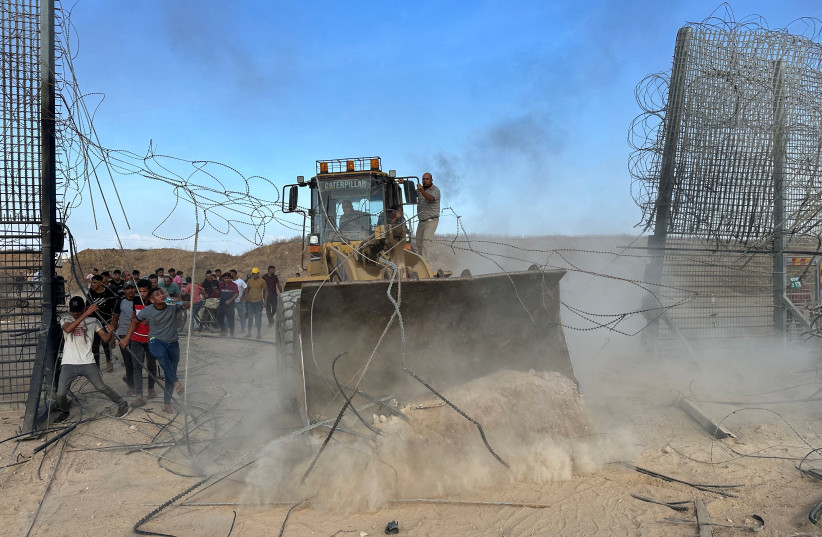It is a simple question – Is Israel returning to its October 6 mindset, or has it embraced a post-October 7 mentality?
This pressing question looms over the government as it grapples with the aftermath of the audacious Iranian assault early Sunday morning when the skies lit up with hundreds of suicide drones, cruise missiles, and ballistic missiles hurtling towards Israel.
The Israel of October 6 would have contained such an attack. Why retaliate after almost all the missiles and drones were intercepted, and except for one girl who was tragically wounded by shrapnel, there were no injuries, deaths or damage to infrastructure?
This policy of containment would have been in line with general Israeli policy at the time. Yes, the IDF occasionally launched an operation over the years to weaken Hamas in Gaza, but it never really went after the root of the problem.
That was all true up until 6:29 am on October 7, when Hamas launched its attack, forcing Israel into a war that shattered the illusion that containment can shield a nation from terror.

People can pretend that fences and missile defense systems provide protection, but in reality the threat only grows until, one day, terrorists infiltrate homes to murder, rape and abduct people.
While Israel’s leaders know this, there are some who are trying to avoid the need to confront Iran, concerned that a retaliatory attack could lead to a wider regional war. Led by the Biden administration, as well as some members of the Israeli government and the IDF, they are trying to portray the successful interception of the drones and missiles as a major victory. Israel, they say, won this round by denying Iran a victory image of a drone hitting an army base or a missile striking Dimona.
To some extent, this is true. Israel’s missile defense architecture - Iron Dome (short range), David’s Sling (medium range) and Arrow 2 & 3 (long range) - performed remarkably Sunday in what can only be described as a testament to Israeli ingenuity as well as the alliance with the US which jointly develops these systems and provides critical funding for them.
The problem is that no matter how good a defense, it is not enough to achieve victory. The reason is because what these systems taught us on October 7 is that while they might protect people from Gaza rockets, they do not really provide security.
Israel cannot let Iran learn a lesson that an attack of hundreds of drones and missiles is tolerated just because they were shot down. Every missile and drone launched at Israel needs to be looked at as if it landed, struck targets, killed people and damaged infrastructure. If not, and nothing is done, it will just be a matter of time until the next attack comes from Iran, and then the next one and the one after that.
What is the best way to prevent further attacks on Israeli soil?
Israeli leaders need to ask themselves what the best way is to prevent the next attack and not allow what happened Sunday morning to turn into a precedent. This is about preventing Iran from turning into Gaza or Lebanon when it comes to the way that, for years, Israel accepted an intolerable reality.
Since October 7, Iran has learned a dangerous lesson. It saw how it received immunity and was not forced to pay a price for arming terrorists and encouraging them to attack Israel. Instead of force, Iran’s actions were met with gifts, like the Biden administration’s decision to issue a sanctions waiver and grant Teheran access to $10 billion.
It is natural that Israel is hesitant. President Biden is urging Prime Minister Benjamin Netanyahu to hold back and instead of military action, embrace the diplomatic initiative of the G7 and the emergency session at the United Nations Security Council.
It is also hard to ignore the regional partnership that played a role in stopping Iran’s attack. Israelis, Americans, British, Jordanians and others played a role in intercepting the drones and missiles. This is the beginning of a partnership that can be built on toward a stronger and safer Middle East. Additionally, Israel is highly dependent on the US, and always needs to consider what the president asks of it with a high degree of gravity.
Nevertheless, the government of Israel needs to do what is in Israel’s interest. It is the one responsible for the survival of the Jewish people and it is for this exact reason that Israel has continued its offensive in Gaza despite global opposition, and why it bombed Iraq and Syria’s nuclear reactors in 1981 and 2007 despite American opposition.
This is the dilemma. It is not simple and it comes with grave consequences.
The writer is a senior fellow at the Jewish People Policy Institute (JPPI), a former editor-in-chief of The Jerusalem Post and author of “Israel vs. Iran: The Shadow War” and “Shadow Strike”.
